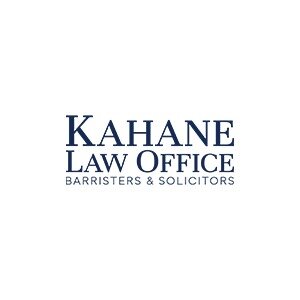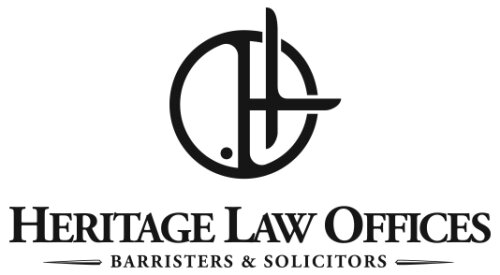Best Private Equity Lawyers in Edmonton
Share your needs with us, get contacted by law firms.
Free. Takes 2 min.
List of the best lawyers in Edmonton, Canada
About Private Equity Law in Edmonton, Canada
Private equity (PE) law in Edmonton, Canada, focuses on the regulations, transactions, and structures involved in investing private capital into businesses that are not publicly traded on stock exchanges. This area of law commonly addresses the negotiation of investment terms, due diligence, regulatory compliance, fund formation, and portfolio management. Edmonton, as a growing hub for entrepreneurship and business development in Alberta, offers unique opportunities and challenges for private equity investors, sponsors, fund managers, and companies seeking capital. Understanding the legal landscape for private equity is essential to mitigate risks, ensure compliance, and optimize investment returns within Edmonton's dynamic business environment.
Why You May Need a Lawyer
Private equity transactions can be highly complex, involving substantial documentation, negotiation, and regulatory considerations. You may require a lawyer experienced in private equity for several reasons:
- Structuring a new private equity fund or investment vehicle
- Conducting due diligence for potential investments
- Negotiating acquisition, investment, or shareholder agreements
- Understanding and complying with securities regulations
- Addressing tax implications for funds or portfolio companies
- Facilitating exits, such as through sales, IPOs, or merger transactions
- Resolving disputes between investors, partners, or management teams
- Ensuring ongoing regulatory filings and reporting are met
Seeking legal advice can help protect your interests, clarify obligations, and support successful transactions in Edmonton's private equity sector.
Local Laws Overview
Private equity activity in Edmonton is influenced by a variety of Canadian federal and Alberta provincial laws, as well as self-regulatory guidelines. Key legal aspects include:
- Securities Regulation: Private equity investments typically fall under exempt market regulations governed by the Alberta Securities Commission (ASC), adhering to rules on investor eligibility, disclosure requirements, and exemptions from public offering rules.
- Corporate Law: Incorporation, share structure, and governance of companies are regulated by Alberta’s Business Corporations Act and, in some cases, the Canada Business Corporations Act.
- Taxation: The Income Tax Act (Canada) and provincial statutes dictate the tax treatment of private equity funds and transactions, affecting structuring decisions.
- Competition Law: Large acquisitions must consider the Competition Act, which regulates anti-competitive practices and reviews certain mergers.
- Contract Law: Private equity deals rely on detailed contracts governing investment terms, management rights, and exit provisions.
- Employment and Labour Laws: Deals often require attention to employment contracts, benefit plans, and regulatory compliance in human resources.
Compliance with these laws is crucial for any party involved in private equity in Edmonton, making legal guidance invaluable throughout all stages of investment.
Frequently Asked Questions
What is private equity and how does it work in Edmonton?
Private equity involves investments in privately held companies or assets through funds raised from institutional or accredited investors. In Edmonton, private equity is used to support business growth, facilitate mergers or acquisitions, and enable company founders to monetize part or all of their businesses.
Who regulates private equity investments in Edmonton, Alberta?
The Alberta Securities Commission (ASC) is the primary regulator for private equity investments, overseeing compliance with securities laws and exempt market rules in Alberta.
Do I need to register my private equity fund in Alberta?
Depending on the fund’s structure, you may need to file offering documents and reports with the ASC, especially if the fund is sold to residents of Alberta. Legal advice can clarify registration and exemption requirements.
What is the difference between private equity and venture capital?
While both involve investing in private companies, private equity generally targets more established businesses and often involves larger investments or controlling stakes. Venture capital usually focuses on early-stage or growth companies with higher risk and return potential.
What types of companies are typical targets for private equity in Edmonton?
Private equity investors in Edmonton often target mid-market businesses across sectors like energy, technology, industrial services, and healthcare, but may invest in firms of any size demonstrating growth or turnaround potential.
What are the main legal risks involved in private equity transactions?
Common risks include regulatory non-compliance, contractual disputes, inadequate due diligence, tax liabilities, misrepresentation by parties, and issues with exit strategies. Legal counsel can identify, manage, and mitigate these risks.
Can private equity firms acquire public companies in Edmonton?
Yes, but acquisitions of public companies involve additional layers of regulatory oversight, including takeover bid rules and continuous disclosure requirements. Such transactions are more complex and typically require specialized legal handling.
What is due diligence in a private equity context?
Due diligence is the process of thoroughly investigating a target company’s financials, operations, legal compliance, and potential risks before making an investment or acquisition. It helps inform negotiation and investment decisions.
How can I ensure compliance with securities law when raising capital privately?
Compliance usually requires meeting specific exemption criteria, providing appropriate disclosure, and making timely filings with the ASC. Legal guidance is critical to avoid regulatory penalties and protect prospective investors.
What happens if a dispute arises between private equity partners?
Disputes are often resolved based on the terms of the partnership or shareholder agreements. Litigation, arbitration, or mediation may be necessary. Experienced legal counsel can help interpret agreements, negotiate settlements, or represent parties in legal proceedings.
Additional Resources
- Alberta Securities Commission (ASC): Regulates securities and exempt market offerings in Alberta
- Canada Business Corporations Act: Provides federal framework for corporate governance
- Alberta Business Corporations Act: Governs incorporations and business operations in Alberta
- Competition Bureau (Canada): Oversees competition policy and merger review
- Canadian Venture Capital and Private Equity Association (CVCA): Industry group offering information on market trends and best practices
- Government of Alberta: Provides business and investment information
- Professional legal associations: Alberta Law Society and Edmonton Bar Association can help locate qualified legal professionals
Next Steps
If you need legal assistance with a private equity transaction in Edmonton, start by identifying your specific needs, such as fund formation, investment structuring, regulatory compliance, or dispute resolution. Gather all relevant documentation and consider outlining your business goals and investment objectives.
Consult a lawyer with experience in both private equity and the Alberta regulatory environment. Most law firms offer initial consultations to discuss your situation, estimate costs, and explain the process. You can locate qualified lawyers through professional associations, recommendations, or legal directories.
Engaging a knowledgeable private equity lawyer will help ensure your transaction meets all local legal requirements, minimizes risks, and maximizes the value and success of your investments in Edmonton.
Lawzana helps you find the best lawyers and law firms in Edmonton through a curated and pre-screened list of qualified legal professionals. Our platform offers rankings and detailed profiles of attorneys and law firms, allowing you to compare based on practice areas, including Private Equity, experience, and client feedback.
Each profile includes a description of the firm's areas of practice, client reviews, team members and partners, year of establishment, spoken languages, office locations, contact information, social media presence, and any published articles or resources. Most firms on our platform speak English and are experienced in both local and international legal matters.
Get a quote from top-rated law firms in Edmonton, Canada — quickly, securely, and without unnecessary hassle.
Disclaimer:
The information provided on this page is for general informational purposes only and does not constitute legal advice. While we strive to ensure the accuracy and relevance of the content, legal information may change over time, and interpretations of the law can vary. You should always consult with a qualified legal professional for advice specific to your situation.
We disclaim all liability for actions taken or not taken based on the content of this page. If you believe any information is incorrect or outdated, please contact us, and we will review and update it where appropriate.











